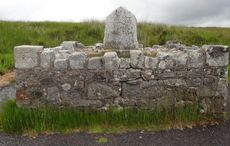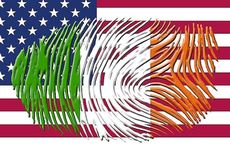Kevin McCarthy is the big man in the political world right now. The Irish American Republican has just been elected to replace Eric Cantor as the number two leader in the House of Representatives. He is the great grandson of a laborer from Cork.
The California Congressman beat Idaho Congressman Raul Labrador for the position of House Majority Leader. Republican members of congress cast their votes yesterday in a secret ballot election.
As The Washington Post noted, it appears that the 49-year-old McCarthy had “consolidated ranks in almost every corner of the House GOP caucus "
Now, things are more unclear. Does the Cantor loss mean Republicans will shift right on crucial issues such as immigration?
After all, anti-immigration and Tea Party groups were crowing that they helped topple Cantor, who was seen as a Republican moderate on the issue.
Now, things are likely to remain muddled, as McCarthy also is seen as a relative moderate on immigration.
Given his family’s history, McCarthy is wise to resist the nativists within his own party.
In fact, given McCarthy’s strong Irish roots, he should be a stronger voice for defending America’s rich tradition of immigration.
McCarthy’s great grandfather, Jeremiah McCarthy, was born in Cork in 1843, according to a book by Wallace M. Morgan entitled History of Kern County California with Biographical Sketches.
“In 1862, [McCarthy] came to Boston and for two years he worked at farming,” Morgan writes. However, having “heard many encouraging reports from California he became interested and in 1867 came out west to see the land of gold and sunshine.”
McCarthy’s first marriage was to fellow Irish Catholic immigrant (from Sligo) Hattie Walsh, who died an early death. McCarthy then married Mayo native Mary Davron in June of 1898.
McCarthy’s labor history would be very familiar to any Irish immigrant of his era.
“In 1870, we find him working on the construction of the railroad at Lathrop. In 1871 he became a foreman on the construction for the Northern Pacific in Washington, where he remained until 1873, then returning to California to become foreman for the Southern Pacific at Borden,” the history book notes.
In short, it was Irish immigrants such as McCarthy who laid down and oversaw the railroads, thus setting America up to become to industrial giant it became in the late 19th and early 20th century.
Similarly, despite what 21st century nativists say, there is no reason to believe today’s immigrants from China, Mexico and Ukraine – as well as Ireland – will cease playing this critical role.
Of course, it must be understood that whatever immigration reform comes out of Washington takes into account questions of national security. The flurry of violent events unfolding speedily in Iraq – and subsequent threats that jihadis may explicitly be targeting America – should not be taken lightly.
But whether the issue is terrorism or the costs of health care and education, in the 21st century – as was the case in the 19th – the benefits of a robust immigration system far outweigh any drawbacks.
The great grandson of Jeremiah McCarthy should know that better than anyone.
Ultimately, McCarthy “resigned and retired” from railroading in 1907 to “engage in farming and stock-raising.” He ultimately acquired over 600 acres “at Bealville where he has made the necessary improvements for carrying on the raising of hay and cattle, his two brands being the quarter-circle under the figure 3 and a double J with bar underneath.”
A century later, Jermiah’s great-grandson is looking to leave his own mark on the political world. Let’s hope Kevin McCarthy keeps his family history in mind when he wields power on the issue of immigration.
(Contact “Sidewalks” at tdeignan.blogspot.com)




Comments